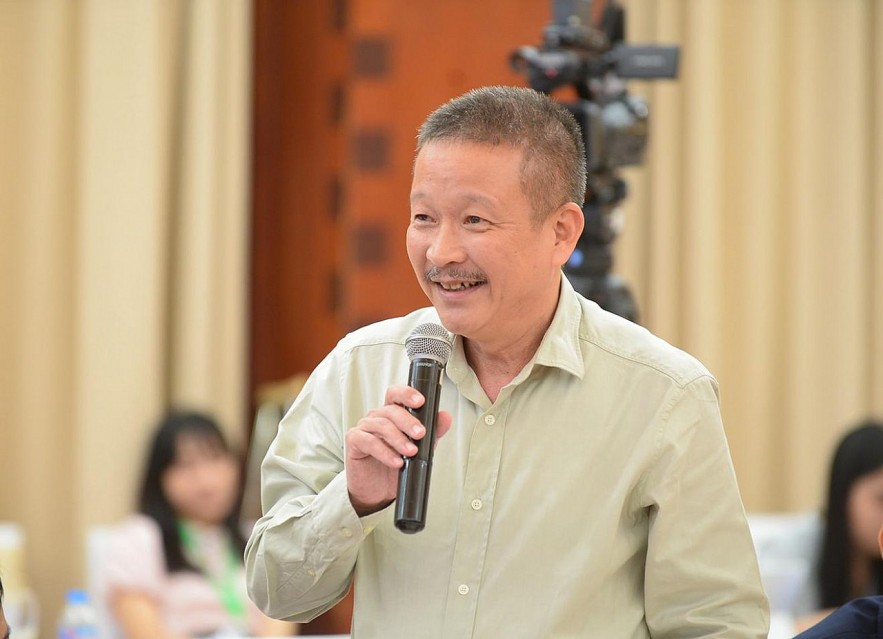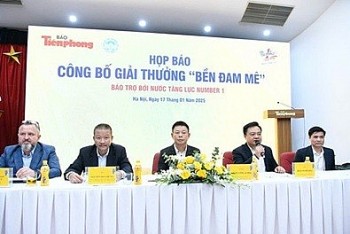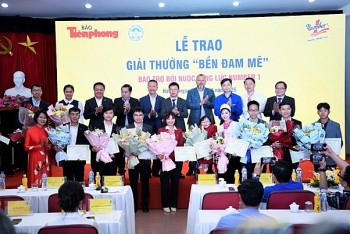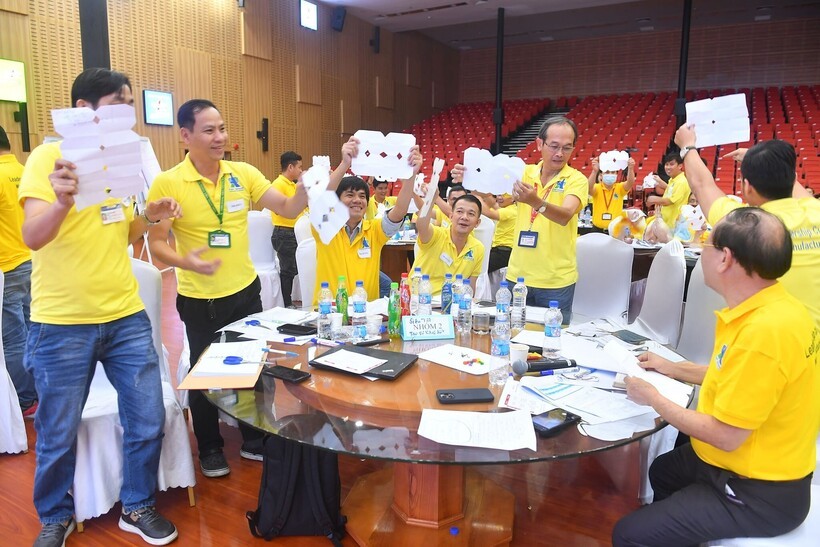Tan Hiep Phat Maintains a Long-Term Vision and Mission
 |
| Products of Tan Hiep Phat. |
First: Enterprise development must serve national development
Business growth should not only enrich individual companies or entrepreneurs. It should contribute to national development, ensuring economic self-reliance and supporting national defense and security. With today’s unpredictable political and economic shifts, both businesses and the nation must proactively prepare for all scenarios.
Many countries—such as Germany, Japan, South Korea, India and China—have long adopted policies to strengthen domestic enterprises as part of strategies to build independent, sustainable, value-creating economies.
Enhancing the competitiveness of Vietnamese enterprises must go hand in hand with optimizing the domestic supply chain and value chain. Business competitiveness is inseparable from national competitiveness.
Along with the goal of developing major enterprises capable of competing globally, Vietnam must also build a strong core of “national enterprises”—domestic businesses aligned with the interests of Vietnam’s supply chain and value chain and contributing to the sustainable development of the national economy.
Second: Trust is essential in business
Businesses need confidence in policies that are stable, predictable, transparent, fair and enforceable.
Stakeholders—including partners, customers, employees and shareholders—must trust one another. A company’s brand is the consumer’s assurance of quality. Consumers must trust that the products they buy are safe, high quality and fairly priced. Businesses must trust in their own capabilities when investing and operating.
Likewise, the State must have confidence in businesses—trusting their compliance, transparency, accountability and competence. With trust, the State can create more opportunities for businesses, reduce administrative burdens, streamline licensing, minimize inspections, increase autonomy, and assign major projects to capable enterprises.
“There are about 5 million household businesses contributing 30 percent of GDP and 9 million jobs. Many of these households do not grow into formal enterprises due to concerns about taxes and high compliance costs, hesitation to expand, uncertainty about the benefits of formalization, and fear of unforeseen risks.”
In Vietnam’s supply chain, long-term agreements for raw materials or services remain rare. Most transactions are short-term or annual, making long-term planning difficult for both buyers and suppliers.
“With our own confidence, for 30 years Tan Hiep Phat has maintained a long-term vision—reinvesting all profits, developing continuously, investing more than USD 300 million in 12 world-class Aseptic lines and eight factories, creating jobs and contributing to the national budget,” Hung said.
Third: National Quality Infrastructure (NQI)
Despite many reforms, gaps still remain between Vietnam’s quality standards and global standards. A product that meets Vietnamese standards does not necessarily meet mandatory standards elsewhere.
Many global quality standards are compulsory in other markets but not in Vietnam. This has led to what some call “domestic standards – foreign mismatches.” Numerous products labeled as meeting standards are in fact non-compliant. Many informal products sold in traditional markets lack labeling or traceability. Counterfeit goods still exist.
NQI is the legal and technical framework that manages standards, metrology, conformity assessment and accreditation within a country.
A strong NQI helps businesses improve product quality, meet domestic and international consumer expectations, and expand market access. It also increases global recognition of Vietnamese products, reduces technical trade barriers and enables greater participation in global supply chains.
 |
| Mr. Nguyen Duy Hung, Chairman of the Governance, Operations and Reputation Committee at Tan Hiep Phat. |
“As of the end of 2023, Vietnam had about 13,500 national standards (TCVN), roughly 62 percent aligned with international standards such as ISO and IEC. Countries like Singapore, Malaysia and Thailand have even higher harmonization rates.”
Tan Hiep Phat applies stringent global quality systems such as Halal Food standards and U.S. FDA certification.
“High quality standards protect consumers and require manufacturers to comply. This, in turn, affects farmers, suppliers and distributors. An athlete who wants to compete at the highest level must train at the highest level,” Hung noted.
Fourth: Building Vietnamese supply chains and value chains
A global value chain includes many components from multiple countries involved in producing, distributing and supporting a product.
Global value chains rely on specialization and optimizing benefits for all participants—from farming, R&D, equipment supply and manufacturing to logistics and distribution. Participants must continuously innovate to stay competitive and avoid being replaced by others offering better or cheaper solutions.
A Vietnamese company can only join a global value chain if it offers greater value to partners compared to alternatives.
Entry into global value chains should not be viewed solely through the lens of exports. Vietnam’s domestic market is part of the global value chain in geographic terms. Many Vietnamese firms operate solely within the domestic market, not connecting to global value chains or using imported inputs. Global value chains can easily enter these sectors, and Vietnam may lose competitive ground in its own market if preparation is inadequate.
Trade protection is not a sustainable solution, and it affects bilateral and multilateral relations. The only viable approach is to strengthen the competitiveness of Vietnamese enterprises integrated into the domestic supply chain and value chain.
To build these supply chains, each sector must be evaluated carefully, with large enterprises at the center, alongside workers, farmers, suppliers and distributors. Most importantly, there are 5 million household businesses—the backbone of Vietnam’s private economy.
A supply chain built on trust, high standards and long-term value creates an independent and resilient Vietnamese economy, reducing reliance on imports. Independence does not mean isolation—it means the capability to integrate proactively and adapt effectively.
Tan Hiep Phat’s supply chain includes farmers, thousands of suppliers, 700,000 distribution points and 3,500–4,000 direct employees. Most input costs remain within Vietnam.
Fifth: Leveraging Vietnam’s strengths
Beyond investing in innovation, technology and human capital, Vietnam should maximize existing advantages.
Geographical indications (GI) identify products that originate from a specific locality and possess qualities or reputation linked to that region. Vietnam has many high quality GI products, offering a competitive edge over imports.
As of August 2024, Vietnam had registered 141 geographical indications domestically but only 41 internationally (39 in the EU and 2 in Japan).
Policies are needed to identify key GI products for international protection and branding, helping bring Vietnamese goods to global markets.
Sixth: Choosing partners for integration
Global integration creates both opportunities and risks. One major opportunity is immediate access to world-class technologies and capabilities.
Vietnamese businesses should seek partnerships with reputable global leaders and build long-term strategic relationships. “Standing on the shoulders of giants” accelerates development.
Over 30 years, Tan Hiep Phat has partnered with world leaders in beverage technology and ingredients such as GEA (Germany), KRONES (Germany), HUSKY (Canada), BRENNTAG (Germany) and TAKASAGO (Japan).
Seventh: Being ready to change, accept losses and seize opportunities during volatility
Market fluctuations, geopolitical tensions and trade conflicts can alter prices, create trade barriers and shift investment and labor flows. Change is difficult and may cause losses, but adaptability is essential. Minimizing risks during volatility is also a way to increase long-term returns.
Market disruptions may harm some but create opportunities for others. These opportunities must be seized.
The State focuses on national goals, while enterprises act in their own interests while fulfilling social responsibilities and supporting national priorities.
“Tan Hiep Phat has implemented a comprehensive set of solutions—from technology investment and innovation to digital transformation, human resources, circular economy initiatives and sustainability—to strengthen competitiveness and perform its social responsibilities.
We propose creating a market environment built on trust, high standards and fair competition, elevating Vietnamese brands and value. At the same time, policies should support strong national enterprises integrated with Vietnam’s supply chains and value networks, ensuring economic self-reliance and national security under all circumstances.
We believe that when the Party—led by the General Secretary—and the Government—led by the Prime Minister—recognize existing challenges and demonstrate true will and determination for change, Vietnam will achieve its development goals.
Private enterprise is not only a key driver of economic development by numbers. It also spreads the spirit of entrepreneurship and service,” Hung affirmed.
 | “Enduring Passion” Award Review Process to be Completed by March 25 The "Ben Dam Me" (Enduring Passion) award's Board of Specialists will complete the selection process before March 25. |
 | "Enduring Passion" Award Spreads Spirit of Perseverance and Dedication to Vietnam Youth With enthusiastic support and engagement from the community, the "Ben Dam Me" (Enduring Passion) award has achieved remarkable success in its inaugural year, underscoring its ... |
 | Tan Hiep Phat Commended for Outstanding Tax Contributions On the morning of June 23, the Regional Tax Department XVI (covering Binh Duong, Binh Phuoc, and Tay Ninh) held a mid-year review conference for ... |
 | Gen Z Says No to Preservatives and Chooses Clean Energy: How Number 1 Achieved the Impossible 8 a.m. Quang Minh (27, accountant, Ho Chi Minh City) opens his laptop. Year end deadlines are waiting. In his hand is a bottle of ... |
Recommended
 Women in Business
Women in Business
Recharge with Number 1 to Become a Better Version of Yourself
 Women in Business
Women in Business
The Journey of Passion Behind the Kitchen: Stories of Those Who Choose the Culinary Path
 Women in Business
Women in Business
Young Female Tech Student Proves Her Number 1 Spirit, Step by Step Chasing Her Research Dream
 Women in Business
Women in Business
Gen Z Travels Far Just to Sleep: When Tourism and Green Tea Help Cool Down Life
 Women in Business
Women in Business
From Deadlines to Nature: How Vietnamese Youth Are Cooling Down Burnout
 Women in Business
Women in Business
The Number 1 Girls: When Passion Is Fueled, Limits Become Only the Starting Point
 Women in Business
Women in Business
Number 1: A Vietnamese Energy Icon Fueling the Passion of a Generation
 Women in Business
Women in Business


